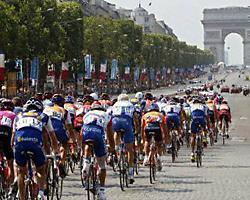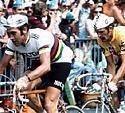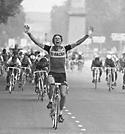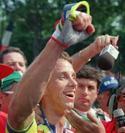
| Tour home |
| Preview |
| Photos |
| Live coverage |
| Start list |
| Stages & results |
| News |
| Map & profiles |
| Tour diaries |
| Features & tech |
| FAQ |
| Tour history |
Recently on Cyclingnews.com |
90th Tour de France - July 5-27, 2003
The legend of the Champs-Élysées
The finale of the Tour de France is a usually procession to Paris followed by a mad dash up and down France's greatest street, the Champs-Élysées. Melanie Leveau looks at a surprisingly recent tradition.
 |
The Tour de France has always finished in Paris, but the final stage did not end in the centre of the French capital until the mid 70s. Until 1967 the race finished on the Parc des Princes but the velodrome was demolished and the finish moved to the track at 'la Cipale' in the Parisian suburb of Vincennes. But the last stage of a French national institution needed a more prestigious venue and what better place than the world's most beautiful avenue?
Closing the Champs-Élysées to traffic was not so easy but after long negotiations, the then-Mayor of Paris Jacques Chirac (now President of France) said yes and the first finish on the Champs-Élysées took place in 1975.
The avenue goes from La Concorde to the Arc de Triomphe, is 1,910m long and 70m wide and is closed only twice a year: for the for the military parade on Bastille Day and for the Tour de France. The tightly packed crowd on 'Les Champs' are part of the atmosphere of the Tour's last stage and the race finale also sees the publicity caravane, team parades and award ceremonies.
Sprinters' domain
The Belgian Walter Godefroot, now manager of Jan Ullrich's Bianchi was the first rider to win on the cobbles of the Champs-Élysées. He won in a majestic sprint from his fellow Belgian and green jersey Rik van Linden.
|
This final stage is the sprinters' domain and reaching the Champs-Élysées is one of the reasons why these riders - who are notoriously not at home in the mountains - can endure so much suffering in the Alpes or the Pyrenees. To win on the Champs-Élysées is the most beautiful victory a sprinter can dream about, it is more than a simple victory: it is a sacrament. Every year there are numerous break-away attempts, but they rarely escape because of the impressive speed the sprinters' teams impose from the front of the peloton - more than 50 km are usually covered in the last hour.
The roll-call of Champs-Elysees winners is a roster of the great sprinters of their day. It includes Godefroot, Maertens, Vanderaerden, Museeuw and Steels from Belgium; Italians Baldato, Minali and Zanini; Dutch rider Van Poppel; German Ludwig; Soviet Abdoujaparov and the Australian McEwen.
Bernard Hinault is the only rider who has won on the Champs-Élysées while wearing the yellow jersey on the shoulders and he did it twice. The first time was in 1979 when he broke away with Joop Zoetemelk, who finished second that year. Hinault did it again in 1982 when he managed to outclass the whole peloton with a monumental sprint.
Suspense and drama
The Champs-Élysées has also been the scene of suspense and drama, no more so than in 1989 when it hosted the finish of the final 24.5 km individual time trial between Versailles and the French capital. Parisian Laurent Fignon and American Greg LeMond were 50 seconds apart at the start of the stage, and nobody expected that Fignon could lose two seconds per kilometre. But the American used new, triathlon-style handlebars to streamline his position and a aerodynamic helmet while the Frenchman opted for a standard position and to let his ponytail flap in the breeze.
LeMond recorded an impressively quick time and the tension at the finish was unbearable as LeMond, his team, the fans and the media waited to see if Fignon could answer it. As the seconds ticked away it became obvious that Fignon was not going to make it, and LeMond's whoop of joy as he realised he'd won has so become one of the Tour's classic moments. Fignon lost his yellow jersey and the final victory by just eight seconds, the smallest margin ever.
Two years later, the Tour was about to finish with a more traditional mass sprint when green jersey Djamolidine Abdoujaparov - known simply as 'Abdou' - crashed with 60m to go while sprinting head-down for the line. He hit the barrier at the side of the road and flew over his handlebars breaking his collarbone and knocking himself unconscious. Shortly after Konyshev took the stage victory Abdou was helped across the finish line to complete his Tour de France, then taken to hospital where he stayed for two days.
The last solo winner - and the last French winner on Les Champs - was Eddy Seigneur. In 1994 he broke away and managed to cross the line a handful of seconds in front of the peloton that was hot on his heels.
In 2001, the green jersey classification went right down to the final day, just as it has this year. The Champs-Élysées finale would determine whether Erik Zabel or Stuart O'Grady would stand on the final podium with yellow jersey Lance Armstrong and polka-dot jersey Laurent Jalabert. Svorada won the stage from Zabel and O'Grady, giving Zabel his sixth green jersey in a row, a new record.
With this year's very close battle between Lance Armstrong and Jan Ullrich, will the Champs-Élysées play a role in the final general classification of the Tour? Will it also determine which of the Australians - Baden Cooke or Robbie McEwen - will be the green jersey?
It would be a fitting finish to the Centenary Tour de France, concluding as it has been conducted for three weeks: full of suspense and surprises.
|





